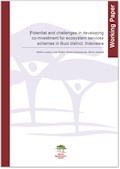| Working Paper Series |
 |
|
| Title | Potential and challenges in developing co-investment for ecosystem services schemes in Buol district, Indonesia | | Author | Betha Lusiana, Lisa Tanika, Sacha Amaruzaman and Beria Leimona | | Year | 2015 | | Publisher | World Agroforestry Centre (ICRAF) Southeast Asia Regional Program | | City of Publication | Bogor, Indonesia | | Series Number | Working Paper no. 211 | | Number of Pages | 40 | | Call Number | WP0207-16 | | Keywords | Ecosystem services, co-investment, participatory and inclusive approach, Central Sulawesi, SWOT analysis |
|
| Abstract: |
Developing a co-investment scheme to enhance the provision of ecosystem services (ES) and farmers’livelihoods requires a comprehensive understanding on the condition of ES and how farmers interactwith and use the natural resources in the landscape. This paper describes the result of the initial phasein developing a co-investment scheme in Buol district, Central Sulawesi, Indonesia. The coinvestmentof ES schemes aims to support the local farmers and government in managing theirlandscape sustainably while also improving farmers’ livelihoods.
Using the Capacity Strengthening for Vulnerability Assessment (CaSAVA) framework, we assess theenvironmental and socio-economic issues faced by both farmers and the local governments, whichinfluence their vulnerability and provide challenges to the implementation of a co-investment for ESscheme. Buol landscapes represent a typical forest frontier area where forest is being converted intomore intensive systems of oil palm plantation and massive smallholder maize systems. Thegeographic location of the district along the coastal line of the Sulawesi Sea offers diverse livelihoodoptions for farmers but also poses many environmental challenges.
The socio-economic problems faced by farmers are related to agricultural pests and diseases, scarcityof farm inputs in the market, and limited access to sell products on the market. The environmentalissues faced by farmers and local governments are related to coastal abrasion and river-bank collapsealong the Buol river, the area’s main river whose catchment takes up a third of the entire district. Thelack of market access and the only recently developed roads have prevented the development ofindustrial or private companies; hence the lack of ES buyers in the area. Therefore, co-investmentschemes involving public funding are deemed the most feasible for Buol district.
The co-investment activities in the form of climate-smart agriculture that can maintain and rehabilitateecosystem service provisioning in the landscape.
Observing the local conditions, we understand that improving farmer and local government awarenessof ecosystem services, and enhancing their ability to monitor the quality and quantity of ecosystemservices in their area are prerequisites to develop sustainable co-investment schemes. The challengesthat lie in the low awareness and capacity of local stakeholders can be overcome through trainings andawareness campaigns aimed at those actors. However, the main challenge lies in the willingness andcommitment of both parties to work together sustainably, which requires a process of learningtogether and negotiation. It is essential that ‘honest’ brokers exist, with the ability and capacity tofacilitate and mediate the process. |
|
|
Download file(s): Click icon to download/open file.
|
| |
File Size |
Description |

|
2017 KB |
Softcopy |
|
|
|
| Viewed in 451 times. Downloaded in 1094 times. |